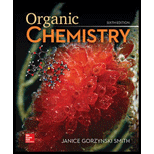
ORGANIC CHEMISTRY (LOOSELEAF)
6th Edition
ISBN: 9781260475630
Author: SMITH
Publisher: MCG
expand_more
expand_more
format_list_bulleted
Question
Chapter 27, Problem 58P
Interpretation Introduction
Interpretation: The sequence of an octapeptide that contains amino acids is to be deduced by using the experimental data.
Concept introduction: Peptide linkage is formed between the amino group of one amino acid and the carboxyl group of other amino acid with the loss of water molecule. Amino acids are naturally occurring compounds in which the amino group is present on the alpha carbon of carboxyl group. The name of amino acids is represented by the one-letter and three-letter abbreviations. Edman degradation is used to identify the N-terminal amino acids.
Expert Solution & Answer
Want to see the full answer?
Check out a sample textbook solution
Students have asked these similar questions
this is an organic chemistry question please answer accordindly!!
please post the solution draw the figures and post, answer the question in a very simple and straight forward manner thanks!!!!! please answer EACH part till the end and dont just provide wordy explanations wherever asked for structures or diagrams, please draw them on a paper and post clearly!! answer the full question with all details EACH PART CLEARLY please thanks!!
im reposting this kindly solve all parts and draw it not just word explanations!!
Please correct answer and don't used hand raiting
Curved arrows are used to illustrate the flow of electrons. Using the provided
starting and product structures, draw the curved electron-pushing arrows for
the following reaction or mechanistic step(s).
Be sure to account for all bond-breaking and bond-making steps.
Select to Edit Arrows
H
H
Select to Add Arrows
>
H
CFCI:
Select to Edit Arrows
H
Select to Edit Arrows
Chapter 27 Solutions
ORGANIC CHEMISTRY (LOOSELEAF)
Ch. 27.1 - Prob. 1PCh. 27.1 - Problem 29.2
What form exists at the isoelectric...Ch. 27.1 - Problem 29.3
Explain why the of the group of an...Ch. 27.1 - Prob. 4PCh. 27.2 - Problem 29.5
What -halo carbonyl compound is...Ch. 27.2 - Problem 29.6
The enolate derived from diethyl...Ch. 27.2 - Problem 29.7
What amino acid is formed when is...Ch. 27.2 - Problem 29.8
What aldehyde is needed to synthesize...Ch. 27.2 - Problem 29.9
Draw the products of each...Ch. 27.3 - Prob. 10P
Ch. 27.3 - Prob. 11PCh. 27.3 - Prob. 12PCh. 27.4 - Problem 29.13
What alkene is needed to synthesize...Ch. 27.5 - Problem 29.14
Draw the structure of each peptide....Ch. 27.5 - Problem 29.15
Name each peptide using both the...Ch. 27 - Draw the product formed when the following amino...Ch. 27 - With reference to the following peptide: a...Ch. 27 - Prob. 31PCh. 27 - Histidine is classified as a basic amino acid...Ch. 27 - Tryptophan is not classified as a basic amino acid...Ch. 27 - What is the structure of each amino acid at its...Ch. 27 - What is the predominant form of each of the...Ch. 27 - 29.37 What is the predominant form of each of the...Ch. 27 - a. Draw the structure of the tripeptide A–A–A, and...Ch. 27 - 29.39 Draw the organic products formed in each...Ch. 27 - 29.40 What alkyl halide is needed to synthesize...Ch. 27 - Prob. 50PCh. 27 - Draw the structure for each peptide: (a) Phe–Ala;...Ch. 27 - 29.52 For the tetrapeptide Asp–Arg–Val–Tyr:
a....Ch. 27 - Prob. 53PCh. 27 - Prob. 54PCh. 27 - 29.55 Draw the amino acids and peptide fragments...Ch. 27 - Prob. 56PCh. 27 - Prob. 57PCh. 27 - Prob. 58PCh. 27 - 29.59 An octapeptide contains the following amino...Ch. 27 - 29.60 Draw the organic products formed in each...Ch. 27 - 29.65 Draw the mechanism for the reaction that...Ch. 27 - 29.66 Which of the following amino acids are...Ch. 27 - 29.67 After the peptide chain of collagen has been...Ch. 27 - Prob. 68PCh. 27 - Prob. 69PCh. 27 - 29.70 The anti-obesity drug orlistat works by...Ch. 27 - Prob. 71P
Knowledge Booster
Similar questions
arrow_back_ios
SEE MORE QUESTIONS
arrow_forward_ios
Recommended textbooks for you

 Chemistry: Principles and ReactionsChemistryISBN:9781305079373Author:William L. Masterton, Cecile N. HurleyPublisher:Cengage Learning
Chemistry: Principles and ReactionsChemistryISBN:9781305079373Author:William L. Masterton, Cecile N. HurleyPublisher:Cengage Learning General, Organic, and Biological ChemistryChemistryISBN:9781285853918Author:H. Stephen StokerPublisher:Cengage Learning
General, Organic, and Biological ChemistryChemistryISBN:9781285853918Author:H. Stephen StokerPublisher:Cengage Learning Organic And Biological ChemistryChemistryISBN:9781305081079Author:STOKER, H. Stephen (howard Stephen)Publisher:Cengage Learning,
Organic And Biological ChemistryChemistryISBN:9781305081079Author:STOKER, H. Stephen (howard Stephen)Publisher:Cengage Learning, Organic ChemistryChemistryISBN:9781305580350Author:William H. Brown, Brent L. Iverson, Eric Anslyn, Christopher S. FootePublisher:Cengage Learning
Organic ChemistryChemistryISBN:9781305580350Author:William H. Brown, Brent L. Iverson, Eric Anslyn, Christopher S. FootePublisher:Cengage Learning


Chemistry: Principles and Reactions
Chemistry
ISBN:9781305079373
Author:William L. Masterton, Cecile N. Hurley
Publisher:Cengage Learning

General, Organic, and Biological Chemistry
Chemistry
ISBN:9781285853918
Author:H. Stephen Stoker
Publisher:Cengage Learning

Organic And Biological Chemistry
Chemistry
ISBN:9781305081079
Author:STOKER, H. Stephen (howard Stephen)
Publisher:Cengage Learning,

Organic Chemistry
Chemistry
ISBN:9781305580350
Author:William H. Brown, Brent L. Iverson, Eric Anslyn, Christopher S. Foote
Publisher:Cengage Learning